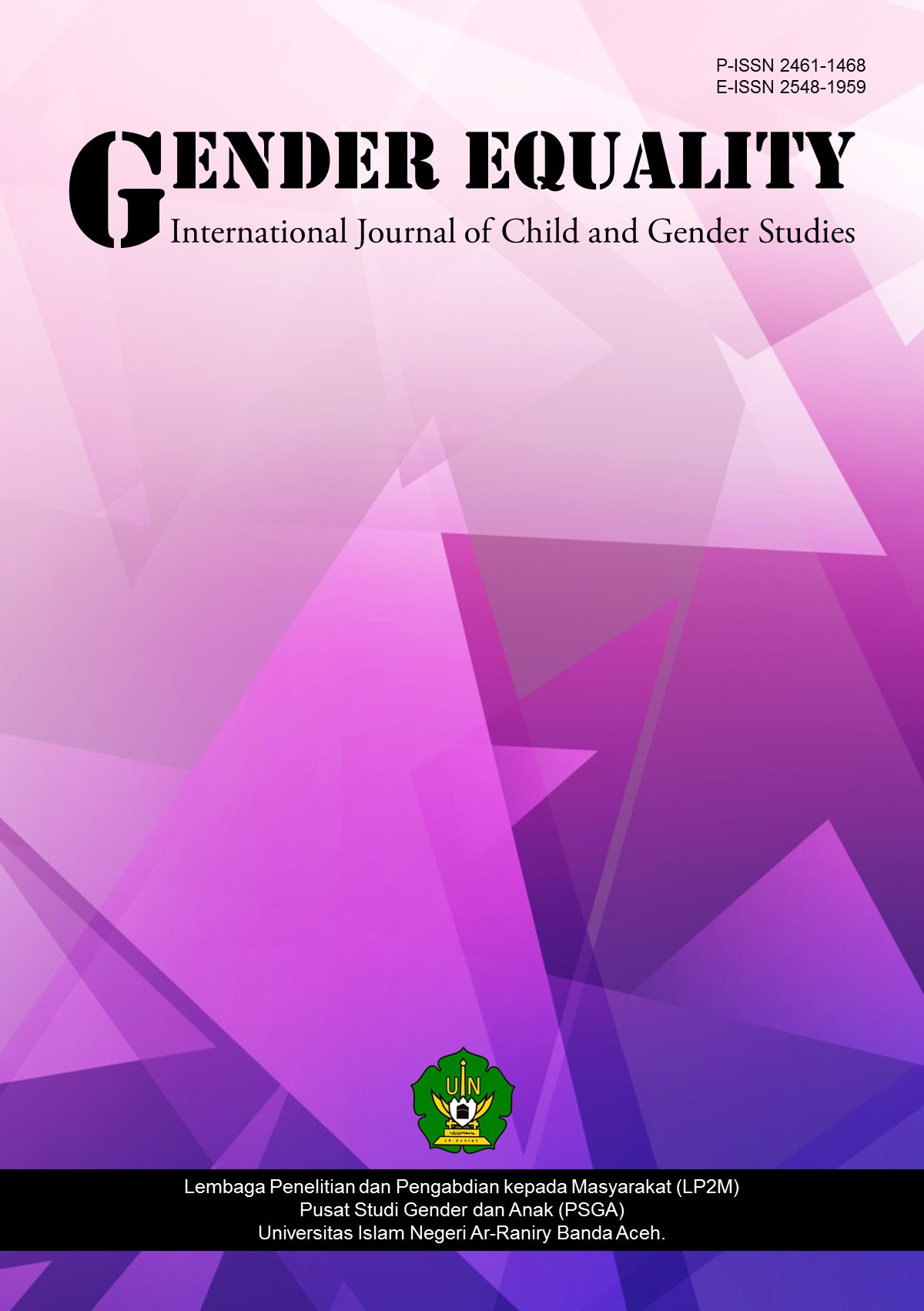Sibaliparri at Majene Regency West Sulawesi Province (The study of fiqh & the marriage culture of Mandar community)
DOI:
https://doi.org/10.22373/equality.v9i2.19565Keywords:
Sibaliparri, fiqh, culture, marriage, MandarAbstract
This research examines sibaliparri in terms of fiqh and the culture of Mandar people. It applies qualitative descriptive research which is obtained based on the result of interview of some leaders and Mandar people from various professions and relevant sources. The result of this research states that sibaliparri is one concept of Mandar cultural values which is firmly intimate on society. This image means the concept of togetherness, mutual cooperation also equality in all fields including household life at a time. The implementation of sibaliparri values in household life of Mandar people can be in the picture of understanding, loving each other, mutual cooperation, and sincerity for example when a wife gives a birth then a husband takes over the household matters. Sibaliparri values related to family welfare are reflected in various fields, namely education, home economics, decision making, religious life, and health. Al-Qur’an is a principle and guide about justice which covers various recommendations to enforce economic justice, cultural politic and gender. In general, Al-Qur’an desires women not to be complementary creature and be the second position compared to men. Al-Qur’an provides guide clearly that all humans are equal and not different in terms of gender instead of the level of loyalty and piety. Other hadiths give women more respect than men and argue that women are domestic creatures but their position is fair and proportional, meaning that in certain circumstances men and women have different roles according to their needs and suitability.References
Ali, M. I. (2022). Rights and obligations of husband and wife according to Islamic law in constructing sakina family. Al Mashaadir Journal, 33(1), 1–12.
Amin, J. (2019). Permasalahan gender dalam perspektif Islam. Buana Gender: Jurnal Studi Gender Dan Anak, 4(1), 1–15. https://doi.org/10.22515/bg.v4i1.1857
Bodi, M. I. K. (2016). Sibaliparri: Gender masyarakat Mandar (U. Rahman, ed.). Solo: Zadahaniva Publishing.
Darmansyah, D. (2019). Orang Mandar raja laut (M. G. dan D. Majid, ed.). Makassar.
Dharmayanti, N., Fatkar, B., & Ratnasari, A. (2022). The Influence of the digital economy and women’s empowerment on the family economy. Sawwa: Jurnal Studi Gender, 17(1), 47–76. https://doi.org/10.21580/sa.v17i1.11300
Fakih, M. (2008). Analisis gender dan transformasi sosial. Yogyakarta: Pustaka Pelajar.
Idham, U. R. (2020). Implementasi nilai-nilai Sibaliparri. Balai Litbang Agama Kementerian Agama Makassar, 5(01), 610–616.
Jubariyah, J., Tajuddin, M. S., & Mansur, A. R. Y. (2006). Siwaliparri dalam perspektif pemberdayaan perempuan (M. S. Tajuddin, ed.). Yogyakarta: Balaniva Publishing.
Latief, A., Maryam, S., & Yusuf, M. (2019). Kesetaraan gender dalam budaya Sibaliparri masyarakat Mandar. Pepatudzu : Media Pendidikan Dan Sosial Kemasyarakatan, 15(2), 160. https://doi.org/10.35329/fkip.v15i2.474
Loeziana, U. (2022). Keseimbangan peran gender dalam Al-Qur’an. Takammul: Jurnal Studi Gender Dan Islam Serta Perlindungan Anak, 11(1), 44–59.
Lucky, N. (2013). Penafsiran emansipatoris dalam al-Qur’an (Perspektif pemikiran Nasaruddin Umar). Marwah: Jurnal Perempuan, Agama Dan Jender, 12(2), 157-176.
Fuadi, F., Ashif, M., Sholihah, S. B., Sundary, S., & Retno, R. (2021). The value of feminism and the role of women in the 4.0 revolution era: Studying the book of Al-Mar’ah Al-Sholihah. Gender Equality: International Journal of Child and Gender Studies, 7(2), 257–272.
Rasyid, A. F. (2020). Epistimologi fiqh dan kontribusinya bagi peneguhan spirit gender. 6(2), 51–60.
Mahyuddin, M., Wahyuddin, W., & Wahyuni, W. (2020). Keluarga nelayan dan budaya sibaliparri’: Menyingkap relasi kesetaraan gender dalam masyarakat Mandar. Al-Maiyyah: Media Transformasi Gender dalam Paradigma Sosial Keagamaan. 13(1), 77–89.
Muhibbin, M. (2017). Pandangan Islam terhadap perempuan. Semarang: RaSAIL Media Group.
Nasruloh, M. N., & Hidayat, T. (2022). Budaya patriarki dalam rumah tangga (Pemahaman teks al-Qur’an dan kesetaraan gender). Yudisia : Jurnal Pemikiran Hukum Dan Hukum Islam :, 13(1), 139. https://doi.org/10.21043/yudisia.v13i1.14325
Nursaptini, M. S., Sutisna, D., Syazali, M., & Widodo, A. (2019). Budaya patriarki dan akses perempuan dalam pendidikan. Jurnal Al-Maiyyah: Media Transformasi Gender Dalam Paradigma Sosial Keagamaan, 12(2), 16-26.
Putri, D. P. K., & Lestari, S. (2015). Pembagian peran dalam rumah tangga pada pasangan suami istri Jawa. Jurnal Penelitian Humaniora, 16(1), 72–85.
Rahmah, S. (2019). Pendidikan dan kesetaraan gender dalam Islam di Aceh. Gender Equality: International Journal of Child and Gender Studies, 5(1), 25. https://doi.org/10.22373/equality.v5i1.5376
Ratnasari, D. (2019). Gender dalam perspektif Alqur’an. Humanika, 18(1), 1–15. https://doi.org/10.21831/hum.v18i1.23125
Sakina, A. I. & A., D. H. S. (2017). Menyoroti budaya patriarki di Indonesia. Share : Social Work Journal, 7(1), 71. https://doi.org/10.24198/share.v7i1.13820
Syasmitha, N. (2016). Sebaliparriq Dalam kajian gender pada masyarakat Mandar di kelurahan Banggae. Jurnal Sosiologi Pendidikan Humanis, 1–23.
Tanwir, T. (2018). Kajian tentang eksistensi gender dalam perspektif Islam. Al-Maiyyah : Media Transformasi Gender Dalam Paradigma Sosial Keagamaan, 10(2), 234–262. https://doi.org/10.35905/almaiyyah.v10i2.505
Downloads
Published
Issue
Section
License
GENDER EQUALITY: International Journal of Child and Gender Studies allows the author(s) to hold the copyright and to retain the publishing rights without restrictions. Authors who publish with this journal agree to the following terms:
- Authors retain copyright and grant the journal right of first publication with the work simultaneously licensed under a Creative Commons Attribution License that allows others to share the work with an acknowledgment of the work's authorship and initial publication in this journal.
- Authors are able to enter into separate, additional contractual arrangements for the non-exclusive distribution of the journal's published version of the work (e.g., post it to an institutional repository or publish it in a book), with an acknowledgment of its initial publication in this journal.
- Authors are permitted and encouraged to post their work online (e.g., in institutional repositories or on their website) prior to and during the submission process, as it can lead to productive exchanges, as well as earlier and greater citation of published work.



